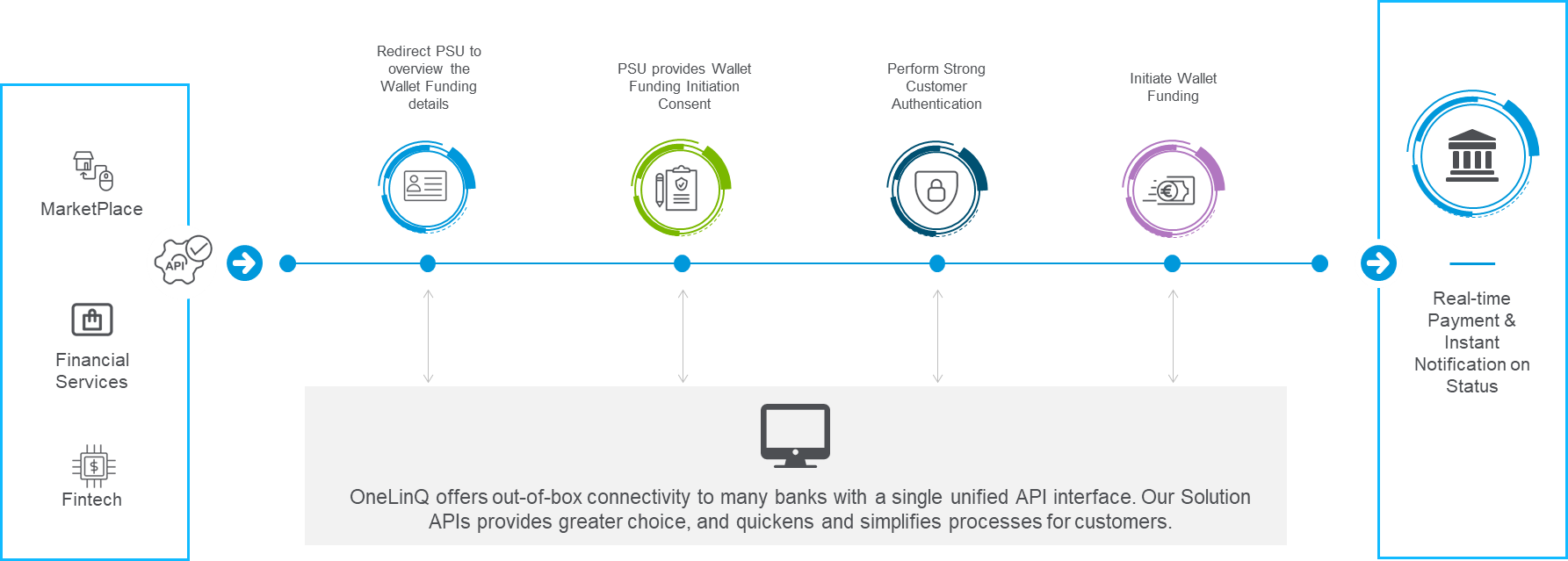Wallet Funding
Summary
OneLinQ Wallet Funding API facilitates Customers to fund the account instantly using Add Funds Link Via Open Banking Rail which supports a fully embedded, high-performance payment experience. Wallet Funding solution use Open Banking/Faster Payment/SEPA Instant payment or equivalent real time payment rail to enable the online transfers and inform the Customers instantly of the fund transfer.
Key Features
1. Secure data access
2. Real-time Payment
3. Instant Notification of Fund transfer
4. No manual data entry
5. Results in JSON/PDF
6. Compliance with regulations
7. REST API Integration
8. White Labelling support
9. Multilanguage support
Wallet Funding APIs
API Name | API Endpoint | API Description |
Payment Initiation Request | POST /createPayment | API to initiate creating the wallet funding request. |
Payment Status | GET /paymentStatus/{paymentId} | API to get the status of the specific payment ID. |
Wallet Funding Flow Diagram
Wallet Funding Steps
Step 1: Wallet Funding Request
The customer initiates the wallet funding request to OneLinQ solution by calling create a payment/add fund API with Amount, Currency, and Payer email id.
Step 2: Redirect Wallet Funding Payment Request
Customers will be redirected to the Hosted Payments Page (HPP) to review the payment details.
Step 3:Validate bank account
If the Customer has provided bank account details during previous transactions and the same has been stored upon request, it will be displayed on the HPP. The Customer can validate these details and change them if required. If the bank account details are not present, then the Customer needs to provide his/her bank account and IBAN to continue to the next step.
Step 4: Payment Initiation Consent
The customer can review the payment details, provide consent, and confirm to proceed further or deny the payment.
Step 5: Initiate Payment
OneLinQ will use the PSD2 API interface of the nominated Customer bank to initiate the payment.
Step 6: Strong Customer Authentication
In case the Customer bank asks for SCA then OneLinQ will support all the possible three options of Authentication viz. Embedded (Default), Re-directed, De-coupled.
Step 7: Execute the Payment
The bank will execute the payment and fund the Customer’s wallet after it is successfully authorized by the Customer.
Step 8: Payment Confirmation
OneLinQ displays a confirmation page with the status of the request. In the case where the status of the payment is “pending” then OneLinQ will keep polling the status from the Customer bank till the final status is received. The Customer can fetch the status from the status API or use the Payment Webhook API which notifies the Customer about the current status.

